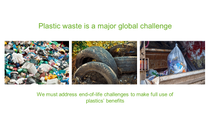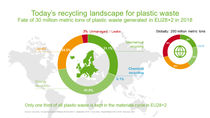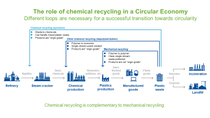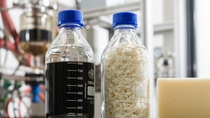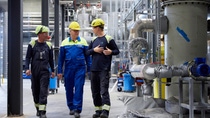Sustainability
Chemical Recycling at BASF

Plastic waste, and especially plastic waste in the world's oceans, represents a major global challenge. Lawmakers around the world are increasing pressure by increasing recycling targets and demanding the recyclability of materials. Many of our customers remain committed to increasing the proportion of recycled material in their products. These challenges can be met with innovations and joint global efforts along the value chain and we will make our contribution to this.
BASF is driving the development of chemical recycling for use on an industrial scale as it makes valuable contributions to sustainability:
- Recycling of plastic waste that is not otherwise recycled
- Recycling of plastic waste into new materials that meet the highest quality standards and are used, for example, in food and medical packaging, safety-relevant automotive parts or in the electronics sector.
- Supporting our customers in achieving their recycling targets
- Conversion of plastic waste into raw materials for the chemical industry and thus contributing to a circular economy
- Saving of fossil resources and CO2 emissions compared to conventional plastic production
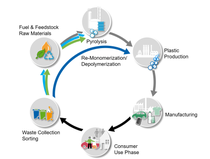
Chemical recycling technologies at BASF
In general, chemical recycling refers to technologies that break down long plastic polymer chains into their basic building blocks through chemical reactions. These secondary raw materials can then be used as a substitute for fossil raw materials in chemical production. Frequently used technologies are pyrolysis, in which plastic waste is converted into pyrolysis oil, and gasification, the process for converting plastic waste into synthesis gas. Another common method is the depolymerization of plastics, also known as solvolysis or remonomerization. In this process, plastics are broken down into their monomers, from which the polymer can be rebuilt. The material obtained by depolymerization therefore re-enters the chemical value chain at a later date as pyrolysis oil or synthesis gas. However, this also means that a single-type plastic waste is required for this process. Suitable starting materials are plastics such as polyamide (PA) or polyurethane (PUR). In addition, there are other technologies, such as hydrogenation. All of these technologies are needed to build a circular economy for plastics. That is why BASF advocates a technology-neutral definition of recycling.
What are the advantages of chemical recycling?
Chemical recycling enables the recycling of plastics for which recycling solutions or capacities are lacking today, thus complementing material recycling. Mechanical recycling is particularly suitable for recycling large quantities of unmixed plastics. Our waste also includes plastic products, which in turn consist of different plastics, plastics that still have impurities (e.g. food residues on the packaging) and plastics that cannot be sorted efficiently. Chemical recycling can help reduce the proportion of plastic waste that is landfilled or thermally recycled. The result is certified products that are indistinguishable from products made from fossil raw materials and that can be used by our customers in demanding applications.
Is chemical recycling environmentally friendly?
When recycling plastic products, the most eco-efficient recycling solution should be chosen. For plastics, where large quantities of unmixed waste are generated without significant impurities, mechanical recycling has a lower CO2 footprint than chemical recycling. Chemical recycling can be used on mixed and contaminated plastics, as a mechanical process is very inefficient in this case. To ensure that the most eco-efficient recycling solution can be chosen, we evaluate chemical recycling - as well as other recycling processes - on the basis of a life cycle analysis. In the pilot phase of the 2018/2019 project, BASF presented prototypes based on chemically recycled material together with customers from various industries. These include mozzarella packaging, transparent refrigerator elements, insulating boxes, car parts or circuit breakers.
